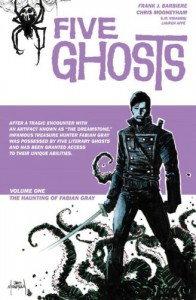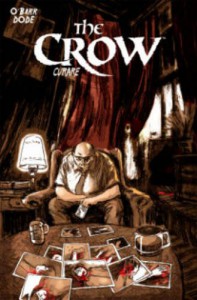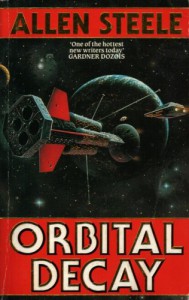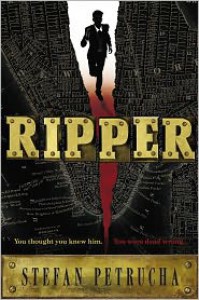
The ‘five ghosts’ refers to five literary entities that have possessed Fabian Gray. He can draw upon them when he needs them to help solve one of his cases, but sometimes they try to take over his body causing uncontrolled bursts of power and requiring him to knock himself out to stop them. A lot of the first part of this book feels very contrived. I remember reading very early Fantastic Four comics where at the beginning of each issue they would find a reason to use their powers to remind the reader what they were all about, often for no reason other than to get somewhere faster. The intro to this story feels just like that, a setup event, tailor made just so he can show off each of the five entities abilities. The problem is, most of the time you wonder if the powers of one would not be better used than the other, but they had to show them all off. It just does not work for me.
Part of the problem for me with this book is that it is not actually one book. Each issue is effectively a ‘done in one’ story that is very loosely tied to the next until the last two issues. Many trades read like one continuous story as they take out the ‘next issue’ boxes and all you are left with is a flashy splash page which was the end of the previous issue, but other than that it feels like one long story. This one rushes to conclude the issue, throwing in the tenuous connection to the next issue, before a complete change of pace as the new issue starts. By the end it all starts to come together, but a good ending does not make up for three issues I really contemplated not reading.
The art in this series gets one thing right and quite a few things wrong. I actually had to break my own rules when reviewing this series. I decided that I did not want to research any of the books I was being given so that they could sink or swim on their own merits, rather than feeling swayed by other peoples’ opinions. The reason I had to look this up was I wanted to know if it was a much older comic reprinted or a translation, or both. This reminds me of reading Tintin, obviously not in the subject matter, but in the printing, the art and the fact that the text in the speech bubbles is always too small for the white space.
This book finishes far stronger than it starts, even the art is more settled at the end. There is a half decent story here, but so much of it feels rehashed from other sources that it struggles to keep my interest. There is an entire issue dedicated to him passing tests to prove himself to this ghosts and this gets so repetitious and stale, especially when you consider how little text there is and how ill defined the art is at this point. This is not a title I can recommend unless you are a big fan of the golden age comics and the pulp heroes that preceded them. In which case this is probably exactly what you were looking for, but for anyone who likes comics from the digital age, it is a definite pass.
Disclaimer: This book was received for free in exchange for an honest review. This does not affect my opinion of the book or the content of my review.

















